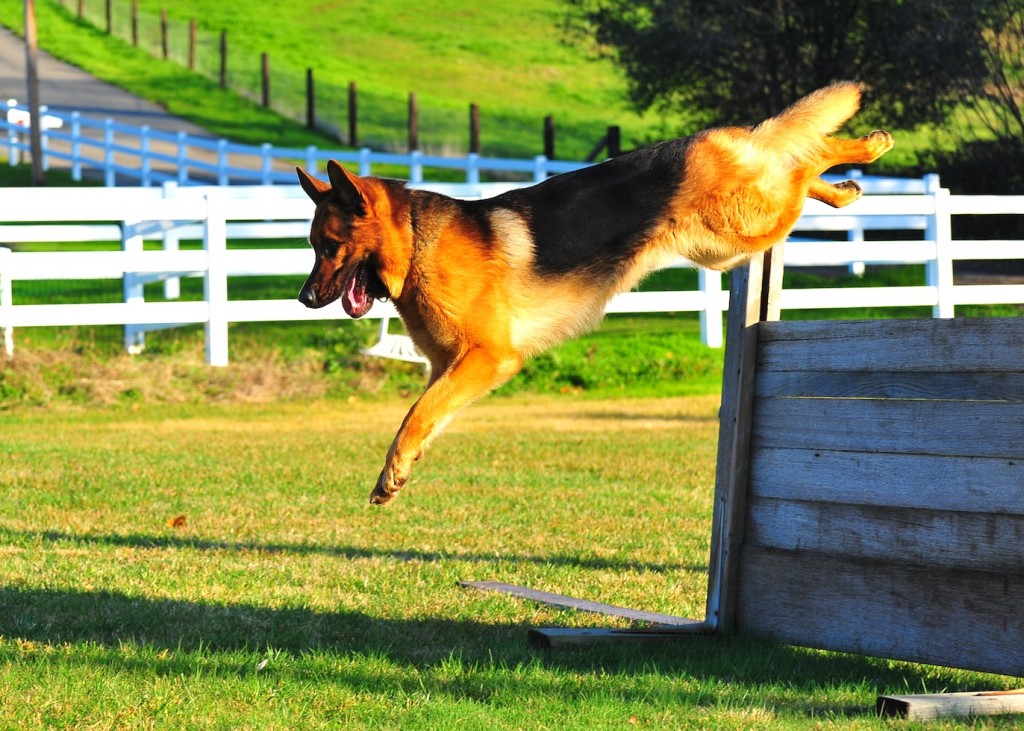Understanding the German Shepherd
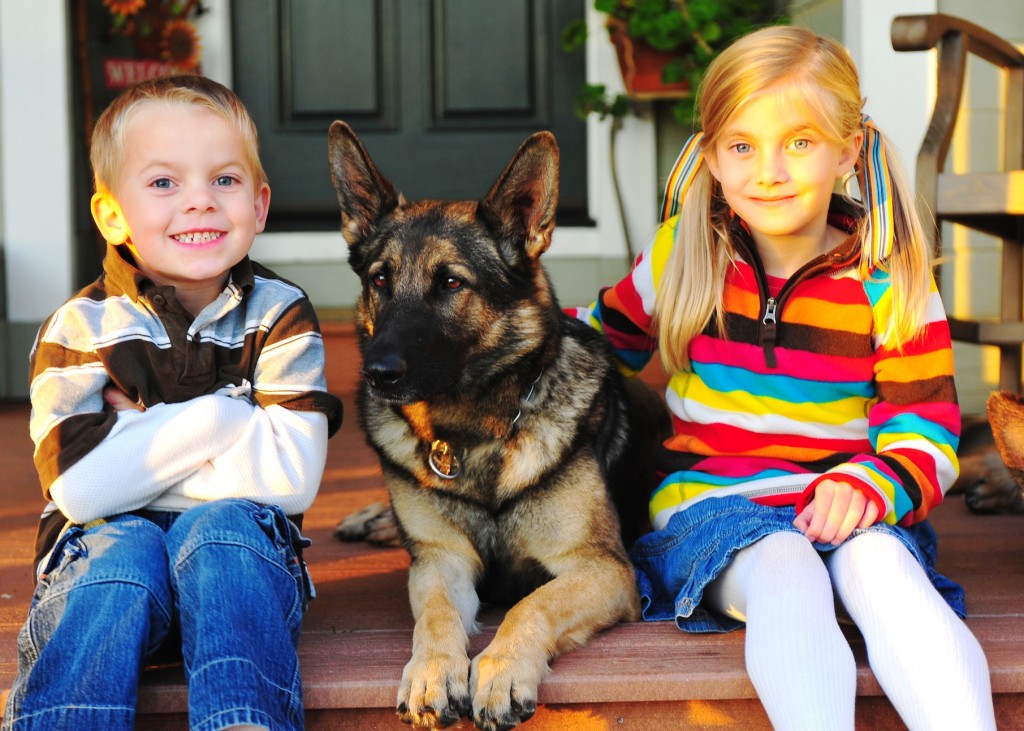 The German Shepherd Dog is one of the most popular dog breeds in the U.S., remaining a top choice not only for police and military work but also for companionship. Sadly, this same popularity has given rise to a large number of so-called “breeders” (backyard breeders, puppy mills, commercial breeders) who regularly release a glut of German Shepherd puppies on the unsuspecting public in an attempt to gain some financial benefit from the breed’s popularity.
The German Shepherd Dog is one of the most popular dog breeds in the U.S., remaining a top choice not only for police and military work but also for companionship. Sadly, this same popularity has given rise to a large number of so-called “breeders” (backyard breeders, puppy mills, commercial breeders) who regularly release a glut of German Shepherd puppies on the unsuspecting public in an attempt to gain some financial benefit from the breed’s popularity.
The result is that many of the German Shepherd Dogs produced as “pets” are poor representatives of the breed, being plagued with a host of health, temperament, and structural problems, and lacking the balance of characteristics for which the breed is known and valued. Because of this, adding a new German Shepherd Dog to your home is an endeavor that requires research and patience!
Looking For A New German Shepherd Puppy?
As spring approaches, we often see an increase in the number of families looking to add a German Shepherd to their home. Regardless of whether you want to purchase a puppy from a breeder or from a rescue or shelter, we encourage you to do your research first! Over the next few blogs, we hope to provide insight into researching the breed and potential breeders. Our approach is two-fold: first, to help prospective GSD owners discover whether or not the GSD really is the breed for them, and second, to help them learn to decipher breeder websites and sort out the good from the bad. By doing so, we hope to prevent a “mismatch” between new owners and their chosen breed, and between new owners and their choice of breeder (or rescue), both of which often end poorly for the dog.
Understanding the German Shepherd Dog
This is of paramount importance. Understanding what the German Shepherd Dog should be will help you decide if this breed is the right match for you. This will also guide you in your search for a good breeder.
First and foremost, the German Shepherd Dog is a working dog. Like most other dog breeds in the world, this breed was bred for a specific purpose. From the very beginning, work was coupled with the breed’s development and preservation throughout the years. All of the qualities and traits valued in the breed–along with its characteristic structure–were selected for and developed because of the need for the dog to herd sheep or work as versatile service dogs. This means two things. First, the traits that make the GSD a good companion have been inexorably linked to the GSD being a working dog; one is not supposed to coexist without the other. This makes selecting a breeder who works their dogs and proves their temperaments a top priority. Second, this translates to a breed of dog that will be quite active, that will need clear and consistent training, and that will often benefit from having a “job” to do, instead of just being a couch potato.
The German Shepherd Dog is not the breed for everyone, and nor should it be! The GSD is not a Labrador Retriever or a Golden Retriever. Their temperament is different from what many people want or expect for the normal every-day ‘family dog’. As a working breed from the herding group, the GSD is alert, active, and quick to respond to environmental stimuli. They are very aware of their environment, and respond to changes in it more quickly than other breeds. They also tend to be more aloof with strangers, and can vary widely in their levels of affection. Some are too busy and active to hold still for petting, while others like to stop and lean on you for more. Some prefer to have nothing to do with strangers altogether.
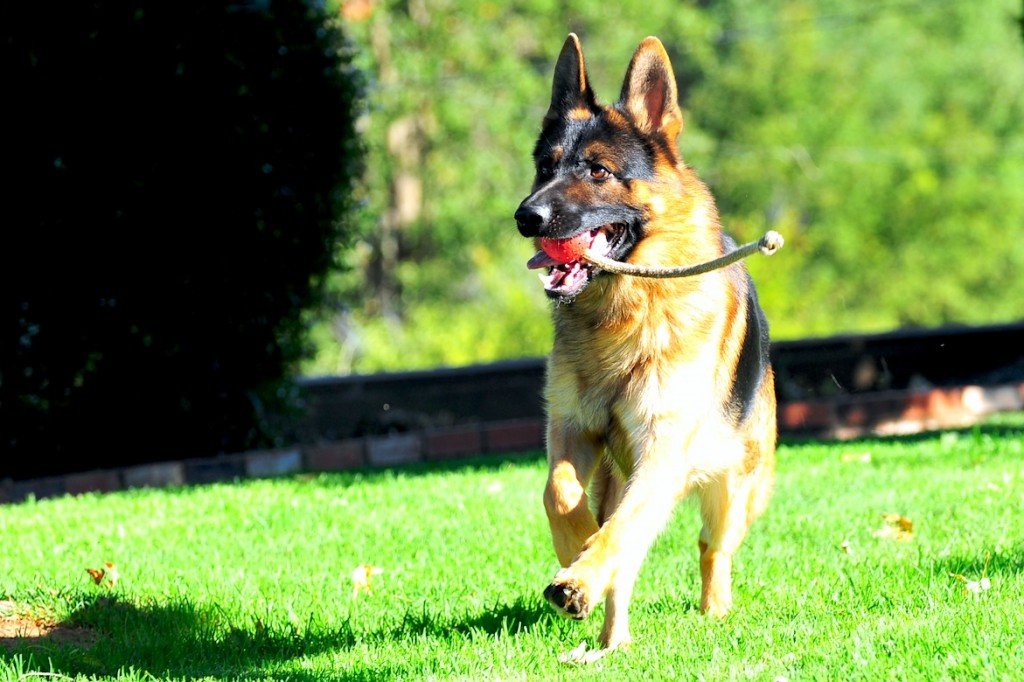 As a breed, GSDs are very vocal. They like to bark, and whine, and yodel, and make all sorts of noises. If you like a silent dog, this is not the breed for you! They are also active and playful, and can be quite noisy during play. They like to bite and carry their toys, and play tug or keep-away. As puppies they can be quite mouthy and nippy. It is this natural inclination and energy for play, coupled with a natural orientation toward their people, that makes this breed relatively easy to train. HOWEVER, the willingness and desire to please can be variable within the breed, with some dogs being more ‘biddable’, while others are more independent and handler hard. Either way, GSDs have a natural orientation toward people, and they will fail to thrive if they are not integrated into their families. The GSD is a breed that does not do well if left out in the backyard, isolated from his humans.
As a breed, GSDs are very vocal. They like to bark, and whine, and yodel, and make all sorts of noises. If you like a silent dog, this is not the breed for you! They are also active and playful, and can be quite noisy during play. They like to bite and carry their toys, and play tug or keep-away. As puppies they can be quite mouthy and nippy. It is this natural inclination and energy for play, coupled with a natural orientation toward their people, that makes this breed relatively easy to train. HOWEVER, the willingness and desire to please can be variable within the breed, with some dogs being more ‘biddable’, while others are more independent and handler hard. Either way, GSDs have a natural orientation toward people, and they will fail to thrive if they are not integrated into their families. The GSD is a breed that does not do well if left out in the backyard, isolated from his humans.
Protective and Intelligent
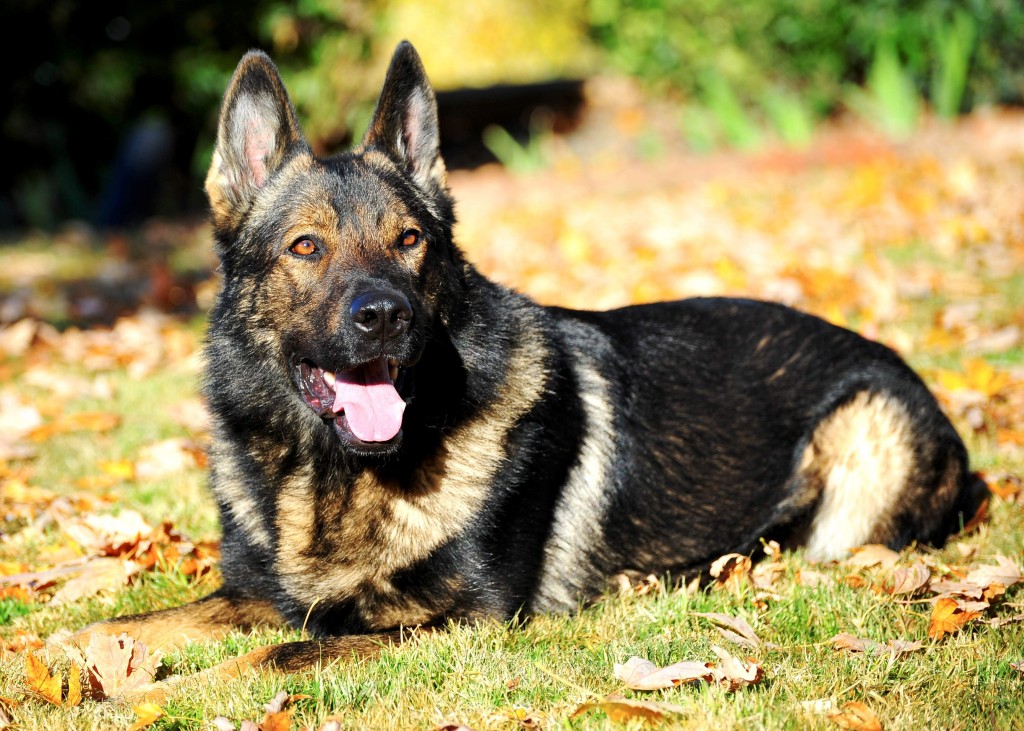 The breed has natural protective tendencies, and they are incredibly loyal to their families. Most German Shepherds have a natural suspicion of outsiders, which should be coupled with a confident, forward nature. However, this natural protectiveness and suspicion means that the GSD will need early and frequent socialization with people of all shapes and sizes as puppies, as adolescents, and as adults. Their protectiveness develops naturally as the dog matures, and should not be “encouraged” in a young puppy by refusing to socialize them with people outside of your home and household. Some dogs are ‘sharper’ than others, showing a greater reactivity to strangers and to changes in their environment, and reacting with less confidence; these dogs will need careful, extensive socialization (and by socialization, we mean with people. Taking dogs to a dog park is not socialization; it is a disaster waiting to happen.).
The breed has natural protective tendencies, and they are incredibly loyal to their families. Most German Shepherds have a natural suspicion of outsiders, which should be coupled with a confident, forward nature. However, this natural protectiveness and suspicion means that the GSD will need early and frequent socialization with people of all shapes and sizes as puppies, as adolescents, and as adults. Their protectiveness develops naturally as the dog matures, and should not be “encouraged” in a young puppy by refusing to socialize them with people outside of your home and household. Some dogs are ‘sharper’ than others, showing a greater reactivity to strangers and to changes in their environment, and reacting with less confidence; these dogs will need careful, extensive socialization (and by socialization, we mean with people. Taking dogs to a dog park is not socialization; it is a disaster waiting to happen.).
German Shepherds are very intelligent, and take readily to early training. Positive training should begin the moment they arrive in your home. Because of their perceptiveness and intelligence, GSDs learn quickly, but what they are learning is not always what you WANT them to learn. If you wait to start basic training (manners, basic commands taught positively) after the 6 month mark, you will have a rowdy, smart, and now more independent adolescent on your hands who has taught themselves many lessons about how their world works, whether you like it or not!
Clear and Consistent Leadership
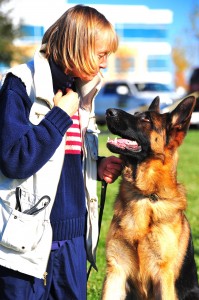 The German Shepherd Dog needs clear and consistent leadership from the first day you bring them home (check out our previous blogs on “What Leadership is Not” and on “Taking Charge” for more information on leadership.). This breed abhors a leadership vacuum, and they will step into that leadership role if they think leadership is lacking. They are assertive dogs, and can be quite “bossy” around other dogs and even people. They can be pushy, regularly testing boundaries as they mature. While positive training methods are important for teaching new behaviors, this is a breed that will eventually choose to test you, and you must be ready to correct the dog if necessary.
The German Shepherd Dog needs clear and consistent leadership from the first day you bring them home (check out our previous blogs on “What Leadership is Not” and on “Taking Charge” for more information on leadership.). This breed abhors a leadership vacuum, and they will step into that leadership role if they think leadership is lacking. They are assertive dogs, and can be quite “bossy” around other dogs and even people. They can be pushy, regularly testing boundaries as they mature. While positive training methods are important for teaching new behaviors, this is a breed that will eventually choose to test you, and you must be ready to correct the dog if necessary.
While they are eager to please their handlers once respect has been developed, German Shepherds are also independent thinkers and active decision-makers; they actively weigh their choices in terms of value, and think through their options. This means they may decide at some point that engaging in an act of disobedience is more of a reward than anything you have to offer, and you must be prepared in your training to make the rules and boundaries clear in an appropriate manner when this occurs. GSDs generally are receptive to fair correction, and most will need it at some point to make the rules very clear to them. We emphasize fair, because this breed also has a level of self-respect not found in breeds like Labs and Golden Retrievers, meaning they may tell you what they thought of that unfair, unnecessary correction.
When it comes to training and living with a German Shepherd Dog, relationship is of paramount importance; the relationship must be well-established and built on trust and respect, but this does not come through becoming a ‘cookie machine’ for the dog, nor through becoming an overly firm tyrant who corrects every infraction as if it were the end of the world. It comes through actively building the relationship through regular interaction and training with you, the handler. Respect must be actively built in your relationship, at every step of the way. You will need to be the confident, fair leader that your German Shepherd needs.
Next blog, we will discuss how your life will change once you get a German Shepherd Dog.
P.S. German Shepherds shed…a LOT.


